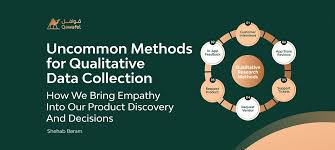The Importance of Qualitative Data Collection in Research
Qualitative data collection is a crucial aspect of research that focuses on gathering non-numerical information to gain insights into people’s thoughts, feelings, and experiences. Unlike quantitative data, which deals with measurable quantities, qualitative data provides a deeper understanding of complex phenomena and allows researchers to explore nuances and subtleties.
Methods of Qualitative Data Collection
There are various methods used to collect qualitative data, including:
- Interviews: Conducting structured or semi-structured interviews with participants to gather in-depth information.
- Observations: Observing and recording behaviour in natural settings to understand social interactions and contexts.
- Focus Groups: Bringing together a small group of participants to discuss specific topics or issues.
- Document Analysis: Examining documents, texts, or artefacts to extract meaningful insights.
The Role of the Researcher
In qualitative data collection, the researcher plays a crucial role in shaping the research process. Researchers must establish rapport with participants, maintain ethical standards, and remain reflexive throughout the study. By actively engaging with participants and being open to unexpected findings, researchers can uncover rich and valuable data.
Challenges and Considerations
While qualitative data collection offers numerous benefits, it also presents challenges. Researchers must navigate issues such as bias, subjectivity, and interpretation. Ensuring data reliability and validity is essential in qualitative research.
In Conclusion
Qualitative data collection is an indispensable tool for researchers seeking to explore complex phenomena and gain deep insights into human behaviour. By employing rigorous methods and maintaining ethical standards, researchers can harness the power of qualitative data to advance knowledge and understanding in various fields.
Five Essential Tips for Effective Qualitative Data Collection
- Ensure that your research questions are clear and specific to guide data collection.
- Use a variety of methods such as interviews, focus groups, and observations to gather rich data.
- Establish rapport with participants to encourage open and honest responses.
- Maintain detailed records during data collection to ensure accuracy and reliability.
- Regularly reflect on your own biases and assumptions that may influence the data collection process.
Ensure that your research questions are clear and specific to guide data collection.
To enhance the effectiveness of qualitative data collection, it is essential to ensure that your research questions are clear and specific. Well-defined research questions serve as a roadmap for data collection, guiding researchers in their exploration of complex phenomena and helping them focus on gathering relevant and meaningful information. Clear research questions not only streamline the data collection process but also contribute to the overall quality and depth of the research findings, enabling researchers to uncover valuable insights and draw meaningful conclusions from their data analysis.
Use a variety of methods such as interviews, focus groups, and observations to gather rich data.
Utilising a diverse range of methods, including interviews, focus groups, and observations, is a valuable strategy in qualitative data collection. By incorporating multiple approaches, researchers can capture a comprehensive understanding of the research topic and gather rich, multifaceted data. Interviews provide in-depth insights from individual perspectives, while focus groups facilitate dynamic discussions among participants. Observations offer valuable contextual information that enhances the depth and validity of the data collected. Employing a variety of methods ensures a holistic approach to data collection and enables researchers to uncover nuanced details and patterns within their study.
Establish rapport with participants to encourage open and honest responses.
Establishing rapport with participants is a fundamental tip in qualitative data collection as it helps create a comfortable and trusting environment that encourages open and honest responses. By building a positive relationship with participants, researchers can foster communication, empathy, and mutual respect, leading to richer and more authentic data. This connection allows participants to feel valued and understood, increasing their willingness to share personal insights and experiences openly, ultimately enhancing the quality and depth of the collected data.
Maintain detailed records during data collection to ensure accuracy and reliability.
Maintaining detailed records during qualitative data collection is essential to uphold accuracy and reliability in research. By meticulously documenting the research process, including participant responses, observations, and any contextual information, researchers can ensure the trustworthiness of their findings. Detailed records not only aid in data analysis and interpretation but also enhance transparency and reproducibility in research. Consistent record-keeping practices contribute to the overall quality of the study and support the validity of the conclusions drawn from the qualitative data collected.
Regularly reflect on your own biases and assumptions that may influence the data collection process.
It is essential for researchers engaged in qualitative data collection to consistently reflect on their own biases and assumptions that could potentially impact the research process. By acknowledging and addressing personal biases, researchers can maintain objectivity and ensure that the data collected is free from undue influence. Regular self-reflection helps researchers to approach the study with an open mind, fostering a more nuanced understanding of the subject matter and enhancing the validity and reliability of the research findings.

No Responses